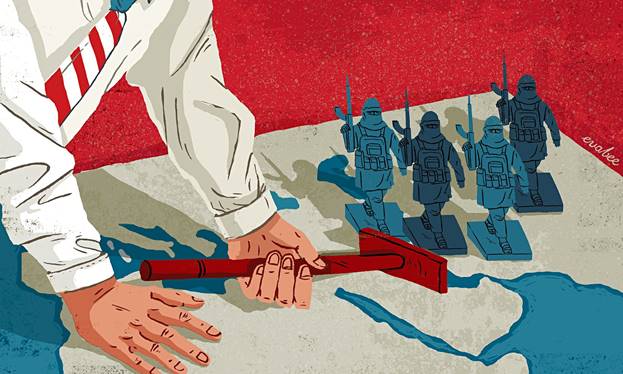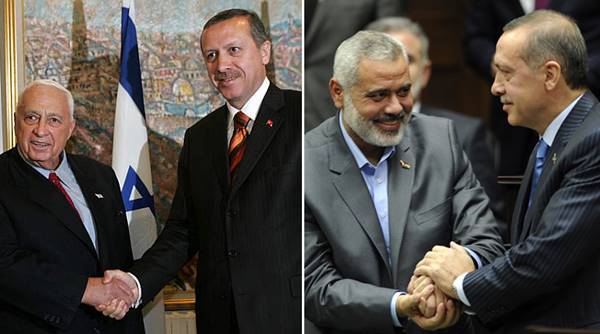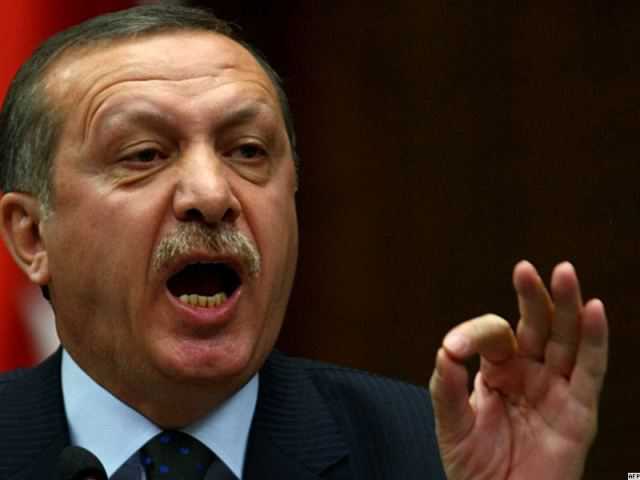
Those familiar with the basics of German history during World War I are aware of its close ties to the Ottoman Empire and, subsequently, with the New Turkey founded by Mustafa Kemal Ataturk.
However, there was very little out there in the form of in-depth and systematic research into this relationship, into the alliance and its consequences.
This is no longer the case. Stefan Ihrig has brought to light very interesting evidence about the admiration of German nationalists, and of course the Nazis, toward Kemal and the genocidal policies of the Young Turks. His findings are included in “Ataturk in the Nazi Imagination,” which is now available in Greek by Papadopoulos editions.
Germany and Turkey were close allies during WWI. How did this alliance come about? Was it of special significance?
At least from the 1890s, Germany and the Ottoman Empire were close and often almost in a state of a quasi-alliance. In many ways the two states had a special relationship. So, the First World War alliance was not a coincidence. But it also was not predetermined. Not all the Young Turks were Germanophile, and many in Germany thought the Ottomans would be a liability rather than anything else. But there were many others who thought that the Ottoman lands as important for the future of Germany. And there were those, including the emperor, who thought that a jihad, declared and led by the Ottomans, would be a trump card in the World War.
So, is it safe to say that the histories of the Ottoman and German empires up until the Nazis’ rise to power and the emergence of Kemal as a leading figure in Turkey from 1922 were parallel?
In reality, no. They were not parallel. However, there were many on both sides who saw them as somewhat parallel. When World War I ended, however, many Germans saw what was happening to the Turks as parallel to their own situation. Both were losers of World War I, both subjected to punitive peace treaties. It is in this perceived parallel situation that the fascination of German center- to far-right newspapers and the public began.
Germany was still in shock about losing the war and afraid of a punitive peace treaty imposed by the Entente. In a mood of nationalist depression, events began to unfold in Anatolia that stirred the passion and dreams of German nationalists. Under Mustafa Kemal the Turks were resisting their own “Turkish Versailles,” the Treaty of Sevres. They took on all of the Entente as well as the Greek army and even defied their own government in Constantinople. What was happening in Anatolia was like a nationalist dream come true for many in Germany. German nationalists and the Nazis especially thought that Germany should copy what the Kemalists were doing.
It seems that initially Hitler was influenced by Mussolini’s example. But now, you claim that it was not only Mussolini but also Kemal Ataturk. Coincidentally, in the cases of both these leaders, the critical years were 1922-23. Would you say that those years were critical for Hitler too? Was it then that he actually formulated the ideology behind the Nazi movement?
In a way, the Nazis, as a political movement, grew up with Ataturk. The Turkish War of Independence coincided with the foundation of the Nazi party and the early years of Nazism. And Ataturk’s war was a major media event in the early Weimar Republic. It was one of the most important news topic and certainly the most important foreign news topic in the German press in the years from 1919-1923.
The Nazis’ fascination with Ataturk stems from this period, the early 1920s. The Nazis, like other German nationalists, discussed “Turkish solutions” to German problems – mostly centered on the question of revising the Versailles Treaty and establishing a different kind of government under a strong leader. It was especially in the months leading up to the Hitler Putsch of late 1923 that the Turkish role model was influential on the Nazis and created an atmosphere which made the Nazis think it was time to act, now. This is also evidenced by the debates during the trial in 1924 of the putschists. Here Hitler referred to his role model Ataturk directly, and put him higher than Mussolini.
Yes, resisting the Entente and revising a Paris peace treaty fascinated the Nazis. But that was not all. There was also the fact that Turkey had “rid itself” of most of its minorities, first of the Armenians during World War I, and second of most of the Greeks in the Treaty of Lausanne population exchange. And finally, for the Nazis, what was happening in Turkey in the 1920s and 1930s was a successful restructuring and reconstruction of the country along nationalist/racial lines. For them it was an example of what a purely national state could achieve under a strong leader.
So Hitler was kind of influenced by Ataturk. Was Ataturk, perhaps as a young man, influenced by leading figures of the German Empire? Also, do we know what Ataturk thought of Hitler until his death in 1938?
Let’s not be fooled: What I am describing in my book was the Nazi side and it was a one-sided love affair. As far as I can tell Ataturk did not reciprocate; he saw Hitler as a dangerous man. Right after Ataturk died, an article was published in a German newspaper. It discussed the qualities of the leader of a nation, what he had to do to deserve to lead. The article underlined, strongly, that the perfect leader needed to work for peace abroad in order to serve his nation. Peace was the central message. And the author was, at least according to the paper, Ataturk himself. To print such an article was not only a clear break with the dominant image of Ataturk in the Third Reich, it was also something of an act of resistance to Hitler.
What about other leading Turkish figures, such as Enver Pasha and others? Were they impressed in one way or another by Germany?
Enver Pasha was indeed influenced by Germany, its recent history, politics, literature and military. But the other way around, things were different: The Young Turks were not very important for the Nazis. Ataturk was paramount. However, some of their policies and legacies such “ethnic cleansing” and the Armenian Genocide before the War of Independence were important and were, in the Nazi view, a major precondition for the success of Ataturk in that war. And the expulsion of the Greeks was a second precondition, in the Nazi view, for the further success of rebuilding Turkey along national lines. Both were for the Nazis something of a “package deal.” What was important for them was that the ethnic minorities – which they and other German nationalists perceived to be like “the Jews” – were gone.
In the Nazis’ view of the New Turkey all this would not have been possible had Turkey not “rid itself” of the minorities. In this fashion the Nazis and other German nationalists were able to portray Ataturk’s New Turkey as something of a test case for large-scale ethnic-racial reconstruction, a test case that for them signaled the power of such a new national state purged of minorities, a test case that not only reaffirmed their own beliefs in the power of ethnically cleansed states but showed various ways of how to achieve this.
To what extent were Ataturk and the new state of Turkey headline news in the German media of the 1920s and especially after 1933?
The relationship with the imagined Turkey of the Nazis also changed in these two periods. In the early 1920s (until 1923/1924), the founding period of Nazism, Ataturk and the Kemalists were a role model for “national action.” However, Ataturk, in the German nationalist imagination, stood for the violent seizure of power, war against the Entente Powers (and Greece) as well as civil war. After the failed Hitler Putsch in late 1923 this was no longer a good role model to mention publicly as the Nazis were now trying to gain power in a legal fashion; in this period Mussolini was a much better reference point for them.
In 1933 all that changed. Now the Nazis’ fandom of Ataturk and his “New Turkey” could be expressed openly again. And right in the first year of the “Third Reich,” in 1933, the Nazis celebrated their role model Turkey in a variety of ways. One of them was Hitler calling Ataturk his “shining star in the darkness” – a phrase which was to become the official line on Turkey in the Third Reich.
During the Third Reich the Nazi admiration of Turkey was elevated to what could be called a “twinning” with the Third Reich – the New Turkey and the New Germany were portrayed like “twin states” and Kemalism and National Socialism as twin movements, similar in almost every fashion. In the beginning, however, many texts and politicians stressed that the “New Turkey” was much further ahead on the path of nationalist (völkisch) reconstruction than the New Germany. The Nazis promised they would do their best to catch up soon.
In this process of discursive twinning, Nazi texts and politicians portrayed the New Turkey as a successful example of the new kind of (hyper-)national state. They emphasized the leadership role of Ataturk, the fact that the New Turkey was born in war, that it was a vibrant state constructing itself anew from the ashes of an old empire, and that all that was possible because it had “gotten rid” of its minorities. The Nazis included in their reading of the ethnic history the Armenian Genocide as well as the Greco-Turkish population exchange but largely ignored the fact that there were still minorities left in Turkey after 1923. In their vision, the New Turkey was an example of the perfectly “cleansed” nation-state.
I was struck when I read that Ataturk died the day after the infamous Kristallnacht. Were the two events connected in any way?
The events themselves were not connected, but they both competed for press attention in the days that followed. The pogrom against Germany’s Jews was not an easy news topic for Nazis, who at the same time wanted both to justify and downplay what happened. Ataturk on the other hand was a favorite German interwar topic. And so his death too become something of a media event in the Third Reich. The main newspapers all ran their own (and differing) essays on his life, work and successes. In many papers the front page was dominated by the announcement of his death and essays about him. In many of the major papers there was a whole string of articles on his death for many days afterward. The coverage in the media shows that this was not the result of a directive of the Ministry of Propaganda but rather something more “grassroots”: For almost two decades the German press and publications had discussed Ataturk and his work so that when he died the papers – from the major national papers to the provincial papers – were ready to present their readers their own narrative and evaluation of Ataturk’s life. They were all similar in their interpretation of Ataturk, but all very different texts, highlighting different characteristics and achievements – ranging from foreign policy to secularism, from the economy to the minorities.
In a way, it’s strange that Hitler admired Ataturk. I mean, he, and the other Nazis, did not see non-Europeans in a positive light. How come Turkey became an exception?
The Nazis had a more diverse view when it came to the larger world then is often assumed. When it came to foreign countries which were not within the very immediate radius of Nazi expansion, race was not the most crucial factor. And Turkey was far away enough for the Nazis not to be a “racial problem.” However, after the Nuremberg laws, some states, including Turkey, asked the German government what the laws and the Aryan concept meant for them. The answer was that for outside of Germany European and non-European were the important categories, rather than Aryan and non-Aryan. And since Turkey strove to be European and Germany supported it on this path, Turkey was a European country for the Third Reich. Involuntarily, this reminds us a bit of the debates over Turkey seeking European Union membership more than a decade ago.
There are other examples where racial and other political considerations produced mixed and strange results. The Greeks and the Armenians were often viewed as similar to the Jews in anti-Semitic, racialist, and Nazi texts, yet at the same time they were viewed as Aryan or at least somehow European. Especially when it comes to the Armenians, this produced strange results.
The main subject matter of your books is a rather unknown historical field, isn’t it? However, many a time, questions have been raised as to the extent that German officers and officials were witness to the Armenian Genocide. Some claim that what the Germans saw back then remained in their minds when it came to the so-called Final Solution in WWII. In short, did Hitler and the Nazis borrow methods from Ataturk’s Turkey?
The Nazi vision of Ataturk’s New Turkey was a highly selective one. Almost everything that conflicted with Nazi ideals and goals was either downplayed or ignored. The emancipation of women was one such topic; it was mentioned in passing but not deemed more noteworthy. Ataturk’s rather peaceful foreign policy was also purposefully misunderstood.
Now, when it came to the minorities, this was a large and important topic for the Nazis and interwar Germany in general. My latest book – “Justifying Genocide” – discusses this more broadly and more in detail. Suffice it to say here that for the Nazis as well as for many of the German nationalists talking about the events of 1915 later on, in the 1920s as well as the 1930s, this was clearly what we understand today as “genocide” – they used different terms, but there is no ambiguity in their understanding of what had happened. For the Nazi vision of Ataturk, what was important in this respect was that the texts of interwar Germany, of the Nazis, and of other German nationalists, often portrayed the “annihilation of the Ottoman Armenians” as the crucial precondition for the double success of Ataturk: 1. revising the Treaty of Sevres by war and supplanting it with the Treaty of Lausanne; 2. rebuilding and building up Turkey – its cities, factories, roads, the state etc – with such breathtaking speed. Thus their admiration of their own, imagined “New Turkey” had clearly radical ethnic undertones and clear ethno-political implications.
Is it true that Hitler told his commanders, “Who, after all, speaks to-day of the annihilation of the Armenians?” in order to stop his officials from having doubts about the persecution of the Jews?
The quote you mention has often been disputed and the debate over whether Hitler said this or not has long distracted us from the more important questions: How much did Germany know about the Armenian Genocide and what did it do with this information?
The ongoing debate about recognition and denial has held the Armenian Genocide in a hostage situation for almost a century and has also led to it being often only a marginal footnote of broader European and world history in our accounts and analyses of the time. Yet it was immensely important at the time, also and perhaps especially so in Germany. Not only was Germany closely connected to it as a state and an ally of the Ottomans, but so were many of its people as diplomats, officers and soldiers. The fact that the Ottoman Empire had garnered so much attention in the German public and political sphere already before 1915 also connected Germany to the Armenian Genocide more closely. And finally, as I show in my latest book, there was a great German genocide debate about the Armenian Genocide in the early 1920s, which brings the whole matter within a mere decade of Hitler’s ascension to power. The Armenian Genocide was both chronologically and geographically speaking much closer to Germany and the Third Reich than is usually alleged.
What I try to show in my book on Germany and the Armenians – “Justifying Genocide” – is less about arguing that the Nazis were inspired by the Armenian Genocide as to rather show just how much knowledge of the Armenian Genocide existed in Germany in the interwar period. First of all we need to stress that the Nazis did not need a teacher when it came to murdering Jews. No responsibility can be shifted away from Germany, no responsibility can be transferred away from Germany to those who committed the Armenian Genocide.
What my research shows is that genocide was much more “thinkable” already before Hitler came to power than we normally assume. And all this also means that a process of “coming to terms with the past” is no automatic guarantee for the right, moral conclusions. And it also means – and quotes from Nazi papers show this – that the Nazis too knew about the Armenian Genocide from early on. There were also personal connections, but most importantly there had been this great genocide debate in precisely the years which were the formative years of the Nazi movement. There is no great distance in time and place between the Armenian Genocide and the Holocaust as so often suggested – and it is time we realized what this means for our view of both German history and of humanity and its capability to rationalize the killing of innocent people.
Would you say that your book is primarily about Nazi Germany and Hitler, or can one also draw conclusions in regard to Kemal’s and the newly founded Turkish Republic’s affinity with Nazi ideology?
The Nazis blew out of proportion what was similar and what they wanted to see as similar. But it underlines one thing: Ataturk and his project were something new, fundamentally so. And for much of the 1920s and 1930s it was not clear in which direction it was going to go, at least not for many observers abroad. It is the novelty and the ambiguity of the early Kemalist project that made it possible for the Nazis (and also the Italian Fascists) to perceive Turkey as a system that was related to themselves and their politics and aspirations.
After the collapse of Nazi Germany in 1945 and the strong ties that were created between postwar Turkey and the USA and NATO, did the Turks keep silent on their intimacy with Nazi Germany? How did they handle Germany’s destruction?
For the Nazis, during World War II, Turkey was more like Franco’s Spain – also nominally neutral, but still more on the Axis side. Like Spain they expected that Turkey would join them at some point in the future, like Spain they felt – at least at many times during the war – that they could rely on Turkey. This included the shipment of vital resources from Turkey, but also meant that politically the Third Reich saw in Turkey a government it could somewhat trust and that it perceived as kindred/similar to them.
For the Turks, however, World War II and their role in it were a different matter. It was mainly about keeping out of it. While there were some moments in which the flirtation of some parts of government and society with the Third Reich seemed to open up possibilities of closer collaboration, such a close collaboration never materialized.
In the postwar world, relations between Germany and Turkey have remained close, especially because of the large numbers of Turkish immigrants living in Germany. Would you say that this sort of “intimacy” between the two countries has its roots in the pre- and mid-war period?
I would warn against identifying all too easy and direct traditions and connections. The image of the Turks changed often and often fundamentally in the last century – as did for example also that of the Greeks in Germany. Even if Turkey was geographically far away, it had been connected through many different links for a long time to Germany. For this reason close relations could again be established. But much of the pre-World War II history, when it comes to Turkey, has long been forgotten. When it comes to images and relations between different peoples and media discourses, the changing cycles seem to be very fast and often very radical. Stereotypes and national images seem to have a much shorter life than often assumed. It is perhaps rather that the long-lasting images of enmity or proximity that we know are an exception rather than the rule.
Stefan Ihrig is a historian in German, European and Middle Eastern history at the Van Leer Institute, Jerusalem, and the University of Haifa. His latest book, “Justifying Genocide – Germany and the Armenians from Bismarck to Hitler” (Harvard University Press, 2016), is available in Greek.















